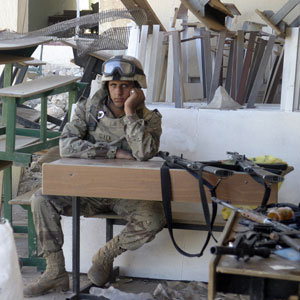
In this picture released by the US Marine Corps, Nov. 14, 2005, an Iraqi Army soldier relaxes after locating a weapons cache in a school allegedly occupied by insurgent forces, in Karabilah, Iraq, Friday, Nov. 11, 2005 (AP)
BAGHDAD, Iraq (AP) – In attacks aimed at Iraqi police on Tuesday, a car bomb blast near a restaurant in eastern Baghdad killed four people while gunmen in a northern town killed four police officers, police said.
Insurgents opened fire on the police patrol in Kirkuk, 290 kilometers (180 miles) north of Baghdad, killing four, while a roadside bomb a few kilometers (miles) away injured three more police officers, Col. Shirzad Mursi said.
In Baghdad,the car bomb exploded while a group of police gathered for a meeting, police Capt. Haider Ibrahim said.
Two officers were among the four dead and seven people were injured, he said, which included two children who were selling vegetable nearby.
Along the Syrian border, U.S. and Iraqi troops continued an operation against insurgents on Tuesday, despite calls by Sunni Arab leaders to halt such operations to encourage a big turnout in next month”s election.
The U.S. command said Tuesday that three U.S. marines have died in combat as part of Operation Steel Curtain along the Syrian border.
One marine from assigned to Regimental Combat Team 2, 2nd Marine Division died Tuesday from wounds incurred from a bomb that exploded Monday. Another marine from the same unit died Monday from a roadside bomb in Obeidi, the same border town, a statement said.
The third marine died from small arms fire on Monday, another statement said. He was assigned to the same unit.
As of Tuesday, Nov. 15, 2005, at least 2,071 members of the U.S. military have died since the beginning of the Iraq war in March 2003, according to an Associated Press count.
At least 1,613 died as a result of hostile action, according to the military”s numbers. The figures include five military civilians.
The U.S.-Iraqi attack against Obeidi was the latest stage of an offensive to clear al-Qaida-led insurgents from a string of towns and cities in the Euphrates River valley near the border with Syria and seal off a major infiltration route for foreign fighters sneaking into Iraq.
"Approximately 50 insurgents are estimated to have been killed in sporadic but heavy fighting," a U.S. statement said. Most of the insurgents died in at least five U.S. airstrikes.
Earlier this month, U.S. and Iraqi forces overran two other towns in the area Husaybah and Karabilah. Unlike in previous sweeps in the area, the Americans and their Iraqi allies plan to establish a long-term presence to prevent insurgents from returning.
U.S. officials have said the Euphrates Valley campaign is also aimed at encouraging Sunni Arabs there to vote in the Dec. 15 parliamentary elections without fear of insurgent reprisals. The Bush administration hopes that a successful election with strong Sunni Arab participation will encourage many in that community to abandon the insurgency.
That in turn would make it possible for U.S. and other international troops to begin heading home next year. Iraqi President Jalal Talabani said Monday in Vienna, Austria, that talks on a withdrawal schedule could begin late next year.
However, major Sunni Arab politicians and religious leaders complain that military operations will discourage voter turnout. On Monday, Iraq”s Sunni vice president added his voice to calls for halting military operations, especially in western Iraq and in a province around the city of Baquba.
"These military operations have gone too far and have a negative impact on the country”s politics," Vice President Ghazi al-Yawer told Al-Arabiya television.
Hundreds of Sunni Arabs marched Monday through the streets of Baqouba, 55 kilometers (35 miles) northeast of Baghdad, to protest Iraqi security raids in the surrounding province last weekend. More than 300 people, mostly Sunni Arabs, were arrested, officials said.
Members of the crowd carried banners denouncing the arrests of Sunni Arabs and chanted, "No to America, no to Britain."
Most Sunni Arabs boycotted the Jan. 30 elections, enabling the majority Shiites and their Kurdish allies to dominate the current parliament. Many Sunni politicians now consider the boycott a mistake and have urged fellow Sunnis to vote next month, although hard-liners in the insurgency and among the Sunni clergy remain opposed.
With casualties rising and elections just a month away, U.S. and other countries have stepped up diplomatic efforts to try to reconcile Iraq”s disparate factions. Secretary of State Condoleezza Rice, British Foreign Secretary Jack Straw, U.N. Secretary-General Kofi Annan and former Russian Foreign Minister Igor Ivanov have all visit Baghdad during the past five days to encourage successful elections.
In Cairo, Egypt, Arab League officials said 100 prominent Iraqis have been invited to a weekend meeting there to pave the way for a full-blown conference, probably to be held early next year in Iraq. The preliminary meeting is not expected to include representatives of insurgent groups or Saddam Hussein loyalists.

Iraqi policemen inspect the wreckage of a police car that was hit in a road side bomb in the city of Kirkuk, north of Baghdad, 15 November 2005 (AFP)

President Bush hurled new arguments against Iraq war critics on Monday as he headed for Asia, accusing some Democrats of “sending mixed signals to our troops and the enemy.” (AP)
